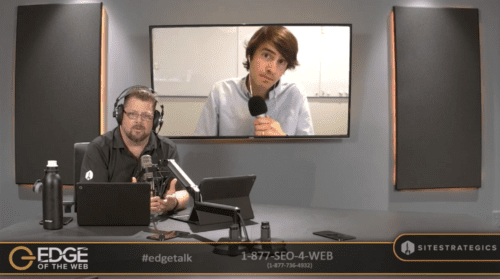Our special guest for episode 364 of the award-winning EDGE of the Web podcast was guest Max Yoder, Co-Founder and CEO of Lessonly. Topics we covered with Max included building better businesses by starting with the right principles, building better teams, and implementing core values the workplace. Here’s what we learned:
Max Yoder: His Background and Experience

Max Yoder is the Co-Founder and CEO of Lessonly, which is the online training software and LMS (learning management system) that helps teams learn, practice, and Do Better Work. Max loves to share his insights and unique perspective on how to build a good culture, core values, and a strong work ethic with employees in the workplace.
Max has been the CEO of Lessonly for eight years now and co-founded the company with three of his friends. One of those friends, Eric Tobias, mentioned how he had started three different businesses, but had never looked seriously at developing training software, which seemed like a good thing to look into. Max was just coming off of a failed business, Quipol, which was polling and survey software. When they looked at training software the LMS field, what they noticed was how a lot of companies don’t buy into them for three reasons: 1) It seems expensive, 2) It seems hard to use, and 3) They don’t know what value they’re going to get out of it. Lessonly was created to address those concerns. The company just surpassed the 1,000-customer milestone, which is huge for them, and has grown its company team to 180 people. That’s rapid growth over an 8-year span!
Focused on Sales and Customer Service
Lessonly is especially focused on sales teams and customer service teams because Lessonly can provide a process that helps those teams get real value out of the software. A key principle of Lessonly’s approach to training is to make sure people get lots of practice after they’ve learned something by reading it. You have to practice using the knowledge to move it from in your head to in your heart and soul, which is the place it needs to be to really impact a person’s behavior. And the focus on sales teams and customer care teams is key because those have such a direct bottom-line impact on client companies, so when Lessonly shows how their approach works and gets bottom-line results, Lessonly becomes very valuable to its customers.
Also, when it comes to training salespeople, some can be “resistant” to the idea they need to be trained. Lessonly’s approach is that the top performers, say the top quartile, as long as they aren’t a toxic force in the workplace, they don’t need training because they’re already doing well. Lessonly also doesn’t focus much on the bottom quartile because more than likely those folks might just be in the wrong job. The focus is on the middle two quartiles because with training they have the potential to move up into the top quartile. The training approach is strategic in terms of the focus, and it makes a huge difference than just ordering everyone to do the training.
Finding the Models and Sharing Them
Although COVID has necessarily caused a shift in the way Lessonly does some things, such as no in-person meetings or trainings like they could do previously, their online on-demand training for sales teams and customer service teams has become all the more important during the pandemic. But the core of what they do hasn’t changed. They still capture examples of what the job done right looks like and present those as models from which other people can learn the core principles of what it looks like when done right. The point is not to imitate the model exactly, because each salesperson has to be true to who they are as a person to really connect with customers in genuine and authentic ways, but the can pick up some important cues then practice them and make them their own.
Of course the big shift for everyone at Lessonly and across all sectors of society was the nearly overnight shift to remote everything. Remote working. Remote learning. Remote healthcare. Remote court appearances and proceedings. The interesting thing is that for the people who find it challenging to get around to the physical places they used to have to go for these things, the forced-to-remote has the potential to make a lot of system more efficient and more equitable. Since everyone’s had to learn how to keep society going remotely, some of those systems should stay in place after the pandemic because in many cases it’s a more equitable way to do things.
In terms of the business impact for Lessonly, the upside is that the company is making bigger deals than before and making those deals faster than before because the needs are even greater and more urgent out there in the COVID economy. A lot is at stake. On the downside, though, is all the companies that would have bought from Lessonly but now don’t even exist, and that’s really unfortunate for everyone concerned. It’s a mixed bag. Those of us who are still in business must take nothing for granted.
Workplace Culture
Lessonly is all about establishing good workplace culture, both within its own walls and for all its client companies. Core values like honesty, integrity, mutual respect, trust, and others are vital for strong workplaces, but how does the new remote work environment dovetail with all of that?
Max is quick and right to point out that he simply doesn’t know. There’s no script for any of this. He notes that he’s learning how to do it each and every day. Some of the things that used to work still work, some don’t. Lessonly is big on workplace camaraderie, and that’s been one of the toughest to figure out how to do remotely because it’s typically an in-person kind of thing. It feels like everything the company has built up in terms of relational capital is being drawn down, and it’s a big concern. Having built up lots of trust is a huge help. There’s also a whole different level of support and affirmations needed with a largely remote workforce since you can’t walk past someone’s office and say “great job” and things like that. You have to be more mindful of how to make positive reinforcements happen.
The Problem with Cancel Culture
Social media has clearly empowered people to be more opinionated than ever, and to be more offended than ever at other people’s opinions, all of which has given rise to “cancel culture” where if you don’t like what people are saying you just “cancel” them, such as “unfriending” them on Facebook and so forth. How can workplaces manage these trends in ways that allow people to have their opinions as well as companies feeling called to take a stand on things more than they used to, all while still maintaining trust and mutual respect?
A friend of Max noted that we need two virtues that Thomas Aquinas talked about to deal with cancel culture. The first is charitableness, meaning you give people the benefit of the doubt and be charitable with what a person just said without rushing to “cancel” them. After all, everybody does some things well and other things less well, so cut people a little slack. The second virtue is grace. This comes into play when you realize someone really has messed something up, and the reason you give them some grace is because if you don’t, they’ll never admit to you again when they’ve messed something up. This is the idea of giving people a second (and third) chance. To build better teams, you’ll need to employee both charity and grace.
What’s behind “cancel culture” the way Max sees it are sadness, anger, and a fear of being judged. We’re not taught how to process sadness and anger, which are normal emotions that are part of the human condition. Instead, we’re taught to bury it. It makes total sense that there would be so much finger-pointing in the face of unresolved sadness and anger. But “canceling” people isn’t the way to deal with it. After all, if you wouldn’t want to be “canceled,” then it’s not something you should be doing to other people. Compassion is a better choice. And if someone continues to make mistakes, you might need to separate from them, but start with compassion, not canceling people.
Upheaval in the Workplace and Leading by Example
As the nation draws closer to a very divisive election and a time when there is more venom and vitriol between opposing political views than ever, how do companies deal with all of that when it inevitably finds its way into the workplace?
Max notes that it his responsibility as CEO to model the kinds of behaviors and virtues he expects of everyone else. If he doesn’t show charity and grace to his direct reports, then he shouldn’t be surprised if his direct reports don’t show charity and grace to their direct reports and on down the line. Leaders must lead by example! And if someone is clearly not aligning their behavior to the model and expectations, then a one-on-one conversation is in order—not public shaming. Shame, fear, and guilt are toxic poisons in the workplace and are not the way to get people to do what needs to be done.
Some will hear these virtues and good behaviors and think accountability will suffer, but that’s simply not true. Max has been invited to military bases to talk about compassion in the workplace, and if the military and it’s high-accountability environment is interested in learning more about the concepts in Max’s Do Better Work book, that’s very significant. Everyone wants to be trusted, valued, and respected.
Connect with Max Yoder and Lessonly
Twitter: @MaxYoder (https://twitter.com/maxyoder)
LinkedIn: https://www.linkedin.com/in/maxyoder
Max’s posts on Lessonly: https://www.lessonly.com/blog/author/lessonly
Max’s book: Do Better Work: Finding clarity, camaraderie, and progress in work and life
Lessonly Twitter: @lessonly (https://twitter.com/lessonly)
Lessonly Facebook: @lessonlyapp (https://www.facebook.com/lessonlyapp)
Lessonly website: https://www.lessonly.com
Time to Check in on Your Digital Marketing ROI?
If you feel like you don’t have a handle on what’s happening with your digital marketing ROI, we can help! Start with a Site Strategics report examining your SEO, content, social media, and PPC. Visit https://edgeofthewebradio.com/roi to get 30% off a comprehensive review of your digital assets!


